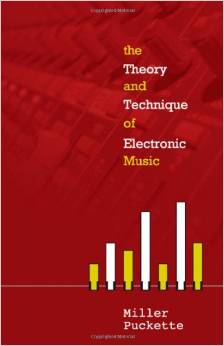
|
FreeComputerBooks.com
Links to Free Computer, Mathematics, Technical Books all over the World
|
|
- Title The Theory and Technique of Electronic Music
- Author(s) Miller Puckette
- Publisher: World Scientific Publishing (May 23, 2007); eBook (Draft)
- Paperback: 348 pages
- eBook HTML, PDF, and PostScript
- Language: English
- ISBN-10/ASIN: 9812700773
- ISBN-13: 978-9812700773
- Share This:

|
This is the first book to develop both the theory and the practice of synthesizing musical sounds using computers. Each chapter starts with a theoretical description of one technique or problem area and ends with a series of working examples (over 100 in all), covering a wide range of applications.
A unifying approach is taken throughout; chapter two, for example, treats both sampling and wavetable synthesis as special cases of one underlying technique. Although the theory is presented quantitatively, the mathematics used goes no further than trigonometry and complex numbers. The examples and supported software along with a machine-readable version of the text are available on the web and maintained by a large online community.
The Theory and Techniques of Electronic Music is valuable both as a textbook and as professional reading for electronic musicians and computer music researchers.
About the Authors- Miller Puckette is a Distinguished Professor of Music, University of California, San Diego.
- Computer, Digital, and Mathematical Music
- General and Miscellaneous Mathematics
- Digital Signal Processing (DSP), Sound and Imaging Processing
- Computer and Video Game Development and Programming
- Introduction to Computer Science
 Similar Books:
Similar Books:
-
 Music and Computers: A Theoretical and Historical Approach
Music and Computers: A Theoretical and Historical Approach
This book provides a resource and guide for those just beginning to look at the field of computer music, as well as for more advanced computer composers who might benefit from a fresh insight.
-
 Scoring Sound: Creative Music Coding with SuperCollider
Scoring Sound: Creative Music Coding with SuperCollider
This book is a creative audio coding tutorial for the SuperCollider audio synthesis programming language. It covers the basics of sound synthesis and introduces the inbuilt tools for algorithmic composition.
-
 Programming Electronic Music in Pure Data (Johannes Kreidler)
Programming Electronic Music in Pure Data (Johannes Kreidler)
The book is designed for self-study, principally for composers. It begins with explanations of basic programming and acoustic principles then gradually builds up to the most advanced electronic music processing techniques, using Pure Data (Pd).
-
 Computer Music: Sound Science and Technology (Wikibooks)
Computer Music: Sound Science and Technology (Wikibooks)
This book is a comprehensive guide and reference that covers all aspects of computer music, including digital audio, synthesis techniques, signal processing, musical input devices, performance software, editing systems, algorithmic composition, MIDI, synthesizer architecture, system interconnection, and psychoacoustics.
-
 Computer Music using SuperCollider and Logic Pro (David Cottle)
Computer Music using SuperCollider and Logic Pro (David Cottle)
This text is a compilation of courses materials in Music Technology, Digital Synthesis, and Computer Assisted Composition. It blends electro-acoustic composition exercises with SuperCollider and Logic Pro topics.
-
 Algorithmic Composition: Introduction to Music Composition
Algorithmic Composition: Introduction to Music Composition
This book provides an overview of procedural approaches to music generation. It introduces programming concepts through many examples written using the Common LISP and Common Music for music composition and sound synthesis.
-
 The Haskell School of Music - From Signals to Symphonies
The Haskell School of Music - From Signals to Symphonies
This book explores the fundamentals of computer music and functional programming through the Haskell, inclues algorithmic music composition, such as stochastic generation, musical grammars, self-similarity, and real-time interactive systems, etc.
-
 How Music and Mathematics Relate (David Kung)
How Music and Mathematics Relate (David Kung)
Understanding the connections between music and mathematics helps you appreciate both, even if you have no special ability in either field - from knowing the mathematics behind tuning an instrument to understanding the features that define your favorite pieces.






